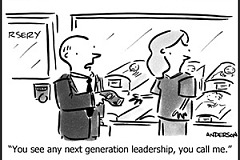 You can choose your friends but you can’t choose your family members, or so the saying goes. This applies equally to work colleagues, unless you’re the one doing the hiring and firing. And even if you are, it’s a foregone conclusion that some of the brilliant people you hire may well find it difficult to get along with existing employees – and vice versa.
You can choose your friends but you can’t choose your family members, or so the saying goes. This applies equally to work colleagues, unless you’re the one doing the hiring and firing. And even if you are, it’s a foregone conclusion that some of the brilliant people you hire may well find it difficult to get along with existing employees – and vice versa.
[quotes]When a worker is confronted with someone they feel like strangling the life out of, it can have a serious impact on productivity.[/quotes] The consequences of this are higher costs through the loss of work time to “witch hunts,” vendettas worthy of 16th century Venetian nobility, decreased staff morale and enthusiasm, and ultimately an effect on the bottom line.
Here are some practical strategies for dealing with “difficult” people in business.
[sidebarright225]
Managers Are Responsible for Results
As a manager, observing bullying, negative thinking, and chronic complaining is a way of telling you your productivity and results are suffering. Negative behavior of any type saps energy out of people, divides your team, and causes friction. That friction shows up in how well – or more likely poorly – your group performs and this directly reflects on your competence.
You can’t ignore it. The old bromide, “One rotten apple spoils a whole barrel,” applies here as negative people try to recruit others to their faction and factions breed friction.
You need your team working toward a positive goal, so confront the problem. As business coaches, we help people understand the root of the problem and see it for what it is: focusing on the conflict rather than the solution. If you’d like to know more, let’s talk about how to change the focus of the problem.
And as one of my friends put it so eloquently “If you can’t change the person, change the person.”
[/sidebarright225]
Find Out If It’s Just You
Are you the only one having a specific problem with someone, or is it universal? Start out by trying to determine whether your experiences with someone are personal and unique, or if others have similar perceptions.
You can discover this by exploring the issue confidentially with a trusted colleague, or by spending time observing the interactions between the person and others he or she deals with. Look for signs that indicate several people have the same concern, then you’ll know whether it is a wider problem or it only applies to you.
Maintain Your Self Control
Losing your temper or otherwise over-reacting is seldom helpful. The more capable you are of maintaining self-control when you’re dealing with difficult people or situations, the better you’ll be at using your judgment effectively. The old maxim of “counting to 10” is very useful for this purpose, because it gives you time to avoid making any statements you could regret. Waiting could also allow time for changes in the situation to develop naturally, which might alleviate the need to take any action.
Control the Narrative
[quotesright]In most conflicts, the parties involved fall automatically into the roles of leaders and followers. [/quotesright] Usually when negativity arises it’s a result of complaints or antagonism by a party who has taken the lead in the situation. Take over the leadership and assume control of the narrative by identifying and proposing solutions or improvements. Consider the positive aspects and the opportunities they offer, instead of dwelling on the problem and its causes.
Have a Difficult Conversation
It’s almost inevitable that at some point you’ll need to initiate a discussion with the person you find difficult. Approach this by asking to have an honest discussion about an issue you are experiencing or a problem you have, which will alert the co-worker to the importance of the situation without making him or her defensive.
Address the Problem, Not the Person
When your conversation takes place, address the problem itself without making it personal. Open the discussion with a reference to what you are experiencing, in a way that explains it from your point of view. Avoid accusing or blaming the person, and present it as a problem you have rather than one they are causing.
For example, instead of pointing out that they have neglected to do something correctly, approach it indirectly and follow it up with a shift toward a solution:
Instead of, I’m tired of your whining and complaining about the work conditions. Something like, Your dissatisfaction with working conditions bothers me greatly. [quotesright]Can we talk about a way to resolve this? [/quotesright]
Stand Firm
[quotes]Many people have “bully” tendencies (sometimes without even realizing it), and try to assert themselves over others purely to achieve one-upmanship.[/quotes] Statistics from a 2010 Workplace Bullying Institute report show 35 percent of Americans have had to deal with bullying in the workplace. Generally, bullies pick on those they perceive as weaker than themselves, and all that’s needed is for their target to stand firm and not allow the bullying to take place.
Show your backbone and stand up for yourself, politely and firmly, and the problem is very likely to go away. If you feel threatened, take steps such as having someone represent you or documenting events as evidence of what’s happening.
Walk a Mile in Their Shoes
Keep an open mind, and remember that often people are difficult because they are dealing with problems of their own. Bullies may have a history of family violence and victimization or “whiners” may be suffering from depression that causes them to view everything from a negative angle.
Choose Your Battles
It’s important to determine whether the circumstances warrant spending the energy to address them. When your situation is temporary or doesn’t affect your work, you might find it easier to avoid associating with the difficult person or to simply grit your teeth until it’s over. In such instances you save yourself the time and energy associated with confrontation and avoid potential complications.
If you’re encountering difficulties with a direct report or someone you are required to work closely with, however, it may be worth approaching the relationship strategically to resolve the problems.
Practicing these strategies when you’re confronted with difficult co-workers will help you communicate more effectively, reduce the irritation, and minimize the disruption to your work. From a management viewpoint, it will enable you to eliminate some of the roadblocks to productivity, which ultimately benefits your bottom line.
Resources for you:
https://www.thebalance.com/how-to-deal-with-difficult-people-at-work-1919377
http://www.chopra.com/articles/7-steps-for-dealing-with-difficult-people
http://www.workplacebullying.org/wbiresearch/2010-wbi-national-survey/
http://www.forbes.com/sites/kevinkruse/2013/06/25/dealing-with-difficult-people/#6cc9c7306329














